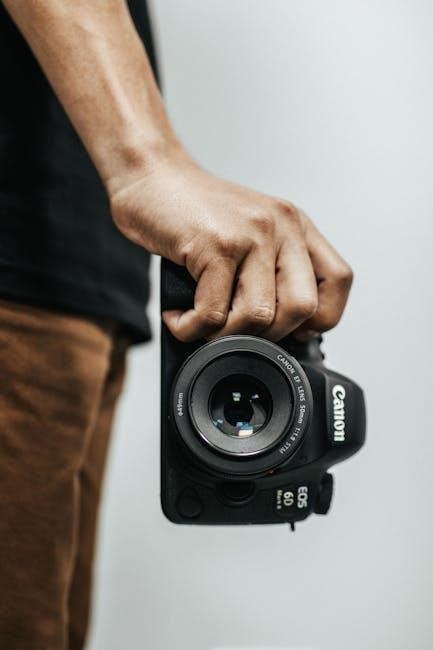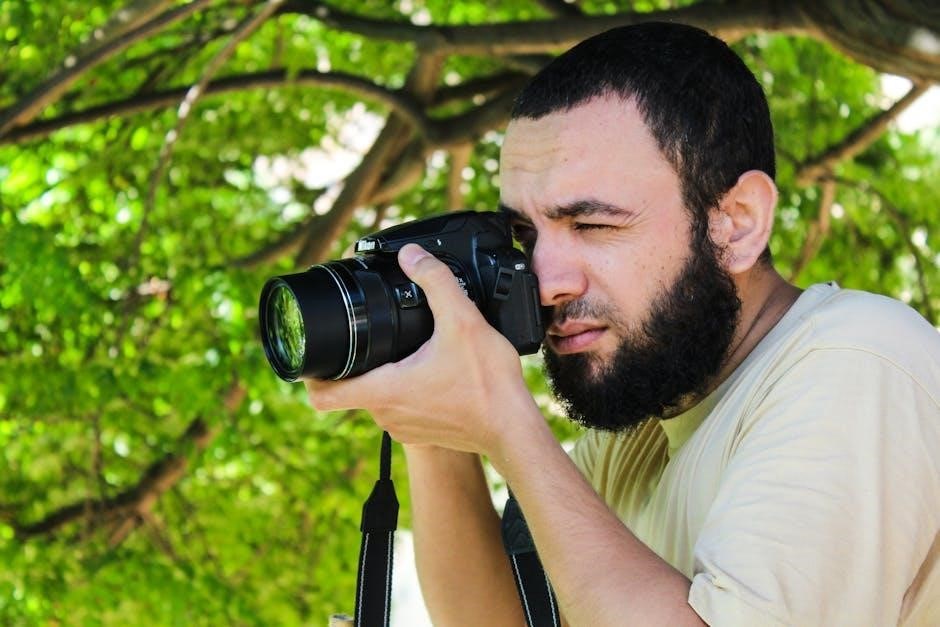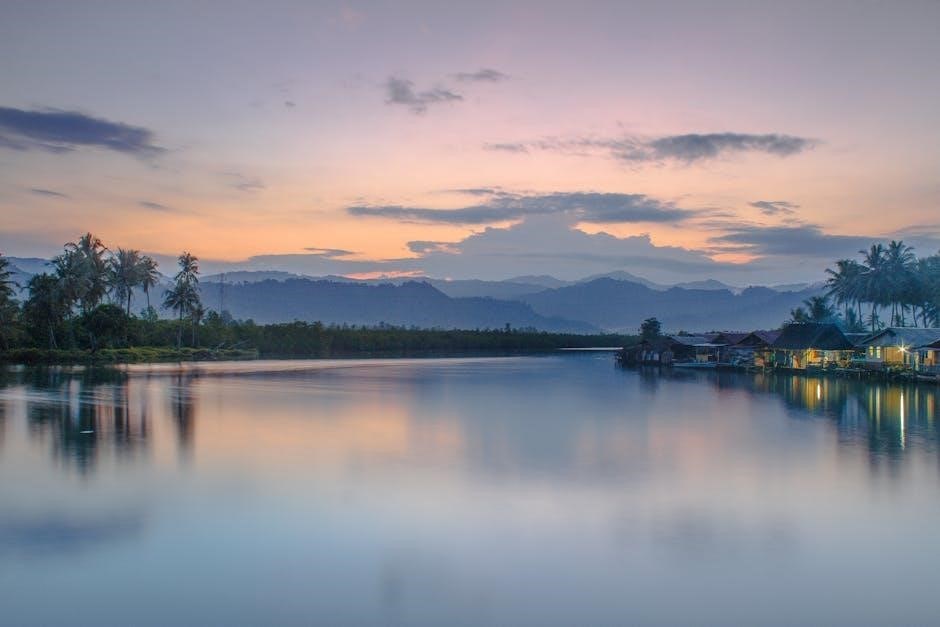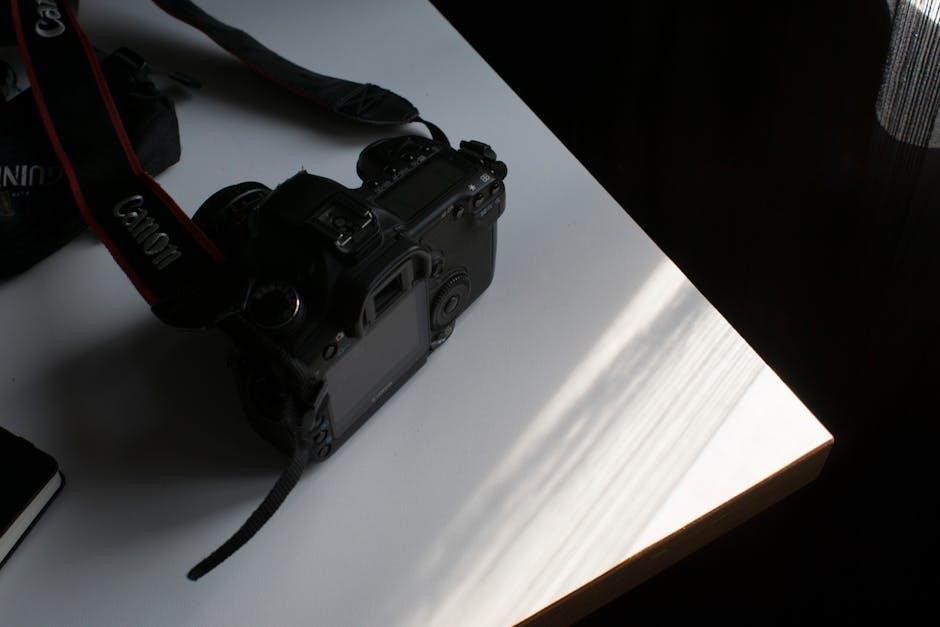The Canon EOS 7D is a high-performance DSLR camera designed for professionals and enthusiasts, offering advanced features like weather resistance, 19-point autofocus, and full HD video capabilities․
1․1 Overview of the Canon EOS 7D
The Canon EOS 7D is an 18-megapixel DSLR camera featuring a high-resolution APS-C CMOS sensor, dual DIGIC 4 processors, and a weather-sealed magnesium alloy body․ It offers 8 fps continuous shooting, Full HD video recording, and a 19-point cross-type autofocus system․ Designed for professionals and enthusiasts, it combines durability with advanced imaging capabilities for both stills and video․
1․2 Key Features of the Canon EOS 7D
The EOS 7D boasts an 18․0 MP CMOS sensor, dual DIGIC 4 processors, and ISO 12800 expandability․ It offers 8 fps continuous shooting, 19-point cross-type AF, and full HD video recording with manual controls․ Weather-sealed, magnesium alloy construction ensures durability, while advanced metering modes, customizable functions, and compatibility with EF-S lenses enhance versatility for photographers seeking high performance․
The EOS 7D manual is essential for unlocking the camera’s full potential, providing detailed explanations of its features and settings․ It guides users in mastering advanced functions, customizing controls, and optimizing performance for various photography scenarios․ This comprehensive resource ensures photographers maximize their creative control and achieve professional results with confidence and precision․ The EOS 7D Mark II offers enhanced features, including a 20․2MP sensor, 65-point AF, and dual-pixel autofocus, surpassing the original 7D’s capabilities for improved performance․ The EOS 7D Mark II boasts a 20․2MP CMOS sensor, dual DIGIC 5 processors, and 65 cross-type AF points, while the original 7D features an 18MP sensor, dual DIGIC 4 processors, and 19 cross-type AF points․ The Mark II also offers an expanded ISO range (100-16000) and faster continuous shooting (10 fps vs․ 8 fps), making it more powerful for professional photographers․ The EOS 7D Mark II features a 20․2MP CMOS sensor, dual DIGIC 5 processors, and 65 cross-type AF points for enhanced performance․ It offers an expanded ISO range (100-16000) and faster continuous shooting (10 fps)․ The Mark II also includes improved weather sealing, a more durable shutter (200,000 cycles), and enhanced video capabilities with manual exposure control, making it a significant upgrade for professionals․ The Canon EOS 7D boasts a magnesium alloy body, ensuring durability and weather resistance, perfect for challenging environments․ Its ergonomic design provides a comfortable grip and intuitive controls․ The Canon EOS 7D features a robust magnesium alloy body, offering exceptional durability and resistance to dust and moisture․ Its weather-sealed construction ensures reliable performance in harsh conditions, making it ideal for outdoor and professional photography․ This build quality, combined with a shutter durability of up to 150,000 cycles, ensures long-lasting reliability for photographers․ The Canon EOS 7D boasts an ergonomic design with intuitive controls, ensuring comfortable handling during extended shoots․ Customizable buttons and a logical layout simplify access to key functions․ The camera’s user-friendly interface, including the Quick Control Dial and Intelligent Viewfinder, enhances workflow efficiency, making it adaptable to various shooting styles and preferences for photographers of all levels․ The Canon EOS 7D features a 19-point cross-type autofocus system for precise subject tracking and a 63-zone metering system for accurate exposure control, ensuring sharp and balanced images․ The Canon EOS 7D’s 19-point cross-type autofocus system ensures precise and rapid subject tracking, even for fast-moving objects․ It utilizes AI Servo II technology for predictive focus tracking and features a dedicated AF processor for enhanced performance․ This advanced system provides reliable focus acquisition in various lighting conditions, making it ideal for sports, wildlife, and action photography․ The Canon EOS 7D offers four metering modes: Evaluative, Center-Weighted, Partial, and Spot․ Evaluative metering uses 63 zones and links to the autofocus system for precise exposure․ Center-Weighted emphasizes the center for portraits, while Partial and Spot metering allow precise control over specific areas․ This system ensures accurate exposure in various lighting conditions, delivering consistent results․ The Canon EOS 7D offers versatile shooting modes, including Auto, P, Tv, Av, and M, allowing photographers to customize settings for personalized control and creative freedom․ The Canon EOS 7D offers several shooting modes for photographers: Auto for point-and-shoot simplicity, P (Program AE) for automatic settings with customization, Tv (Shutter Priority) to control shutter speed, Av (Aperture Priority) to adjust aperture, and M (Manual) for full control over both․ Each mode provides flexibility, catering to different skill levels and creative needs effortlessly․ The Canon EOS 7D allows photographers to tailor their shooting experience through customizable functions․ Users can adjust settings like autofocus tracking, metering modes, and button assignments to suit their preferences․ These custom functions enhance control and productivity, enabling photographers to optimize the camera for their specific needs and shooting styles․ The Canon EOS 7D offers Full HD video recording at 30p, 24p, and 25p with manual exposure control, audio adjustments, and selectable ISO settings․ The Canon EOS 7D captures stunning Full HD video at 30p, 24p, and 25p frame rates, offering cinematic quality and flexibility․ With manual exposure control, users can adjust settings like aperture, shutter speed, and ISO during recording for precise creative control․ The camera also supports selectable frame rates, enabling filmmakers to achieve various artistic effects and professional-grade video output․
The Canon EOS 7D offers manual exposure controls during video recording, allowing users to adjust aperture, shutter speed, and ISO for tailored results․ Additionally, it features manual audio level adjustment, enabling precise sound capture․ These controls enhance creative freedom, making the 7D a versatile tool for both photographers and videographers seeking professional-grade output in various shooting scenarios and conditions․ Canon EOS 7D offers an ISO range of 100-12800, delivering excellent low-light performance․ It effectively manages noise at higher settings, ensuring high-quality results in various conditions․ The Canon EOS 7D features an ISO range of 100-12800, expandable to 12800, making it ideal for low-light photography․ Dual DIGIC 4 processors optimize noise reduction, ensuring sharp, detailed images even in challenging lighting conditions․ This capability allows photographers to capture high-quality shots without excessive noise, making it versatile for both professional and enthusiast use․ The EOS 7D effectively manages noise at high ISOs using its dual DIGIC 4 processors, which optimize image processing and minimize grain․ While noise increases at ISO 6400 and above, it remains manageable for most applications․ For best results, use noise reduction tools in post-processing or enable in-camera noise reduction for cleaner images in low-light conditions․ The EOS 7D delivers high-speed continuous shooting at 8 fps, making it ideal for action photography․ Its buffer capacity allows for extended bursts, optimizing workflow efficiency․ The Canon EOS 7D offers impressive high-speed continuous shooting at 8 frames per second, making it ideal for capturing dynamic action sequences and fast-moving subjects․ This feature is particularly beneficial for sports and wildlife photography, allowing photographers to freeze fleeting moments with precision․ The camera’s buffer capacity supports extended bursts, ensuring uninterrupted shooting sessions․ Using fast memory cards and optimizing file formats like RAW or JPEG can further enhance performance․ To maximize the Canon EOS 7D’s buffer capacity, use high-speed memory cards and adjust file formats․ Shooting in JPEG increases burst capacity compared to RAW․ Reducing file sizes via settings like ISO sensitivity and smaller RAW options also helps․ Regularly updating firmware ensures optimal performance․ Balancing these factors allows for extended continuous shooting sessions, making it ideal for capturing sequential action shots efficiently․ The Canon EOS 7D features a user-friendly menu system with tab-based navigation, allowing quick access to shooting, playback, and setup options․ Customizable My Menu and registered settings enhance efficiency․ The Canon EOS 7D menu system is intuitive, with tab-based navigation for easy access to shooting, playback, and setup options․ Users can scroll through tabs using the Quick Control Dial, selecting options with the SET button․ The menu also features customization options, such as My Menu, allowing users to register frequently used settings for quick access․ This streamlined design enhances workflow efficiency․ The Canon EOS 7D allows users to customize the menu system for streamlined workflows․ By registering frequently used settings in the My Menu tab, photographers can quickly access their most-used options․ Additionally, custom functions enable assignment of specific features to camera buttons, optimizing personal shooting preferences․ This customization enhances efficiency and tailors the camera to individual workflows․ The Canon EOS 7D is compatible with EF-S lenses, including the EF-S 15-85mm and EF-S 10-22mm, and supports external flash units for enhanced photography versatility․ The Canon EOS 7D pairs well with EF-S lenses like the EF-S 15-85mm f/3․5-5․6 IS USM and EF-S 10-22mm f/3․5-4․5 USM for wide-angle shots․ The EF 70-200mm f/4L USM is ideal for telephoto needs, offering sharp images and reliable performance․ These lenses, along with external flashes, enhance the camera’s versatility for various photography styles and lighting conditions․ For enhanced lighting control, the Canon EOS 7D supports external flashes like the Speedlite 580EX II, offering advanced flash metering and wireless capabilities․ Additional accessories include the Battery Grip BG-E7 for extended shooting and improved ergonomics, as well as remote shutter releases and high-capacity memory cards for seamless photography sessions․ The Canon EOS 7D may encounter issues like autofocus errors or unexpected shut downs․ Regular firmware updates and resetting the camera often resolve these problems․ Consulting the manual and Canon’s support resources can provide detailed troubleshooting steps․ Autofocus issues can often be resolved by cleaning the sensor and lens․ Metering problems may require adjusting settings or calibrating lenses․ Ensure firmware is updated and settings are reset․ Using the correct AF mode for the scene and checking metering patterns in the manual can help․ Contact Canon support if problems persist for professional assistance․ Common error messages can often be resolved by resetting the camera or updating firmware․ Visit the Canon website for the latest firmware version and follow installation instructions using EOS Utility․ Ensure no interruptions during updates to avoid damage․ Updated firmware enhances performance and fixes bugs․ If issues persist, refer to the manual or contact Canon support for assistance․ The Canon EOS 7D is a powerful tool for photographers, offering exceptional performance and customization․ To maximize its potential, explore manual settings and stay updated with firmware improvements․ The Canon EOS 7D is a high-performance DSLR designed for professionals and enthusiasts․ It features an 18MP CMOS sensor, dual DIGIC 4 processors, and captures images with impressive speed and clarity․ With 8 fps continuous shooting and a 19-point cross-type AF system, it excels in dynamic photography․ Its weather-sealed body and full HD video capabilities make it versatile and reliable for various shooting conditions․ This camera is a testament to Canon’s commitment to quality and performance․ To maximize your Canon EOS 7D’s potential, familiarize yourself with its manual and explore custom settings․ Experiment with shooting modes like Manual, Av, and Tv for creative control; Regularly update firmware and clean the sensor for optimal performance․ Practice various techniques and review your photos to refine your skills․ Explore its video capabilities for versatile storytelling․1․3 Importance of the Canon EOS 7D Manual
Canon EOS 7D vs․ EOS 7D Mark II
2․1 Differences in Specifications
2․2 Upgrades and Improvements in the Mark II

Camera Build and Design
3․1 Durability and Weather Resistance
3․2 Ergonomics and User-Friendly Interface

Autofocus and Metering Systems
4․1 19-Point Cross-Type Autofocus System
4․2 Metering Modes for Accurate Exposure

Shooting Modes and Customization
5․1 Understanding Auto, P, Tv, Av, and M Modes
5․2 Custom Functions for Personalized Shooting

Video Capabilities and Manual Controls
6․1 Full HD Video Recording Features
6․2 Manual Exposure and Audio Controls

ISO Range and Noise Performance
7․1 ISO Sensitivity for Low-Light Photography
7․2 Managing Noise at High ISO Settings

Continuous Shooting and Buffer Capacity
8․1 High-Speed Continuous Shooting (8 fps)
8․2 Optimizing Buffer Performance

Menu System and Navigation
9․1 Navigating the Canon EOS 7D Menu
9․2 Customizing the Menu for Efficiency

Accessories and Compatibility
10․1 Recommended Lenses for the EOS 7D
10․2 External Flash and Other Accessories

Troubleshooting Common Issues
11․1 Resolving Autofocus and Metering Problems
11․2 Fixing Error Messages and Firmware Updates
12․1 Recap of the Canon EOS 7D’s Strengths
12․2 Tips for Getting the Most Out of Your Camera
